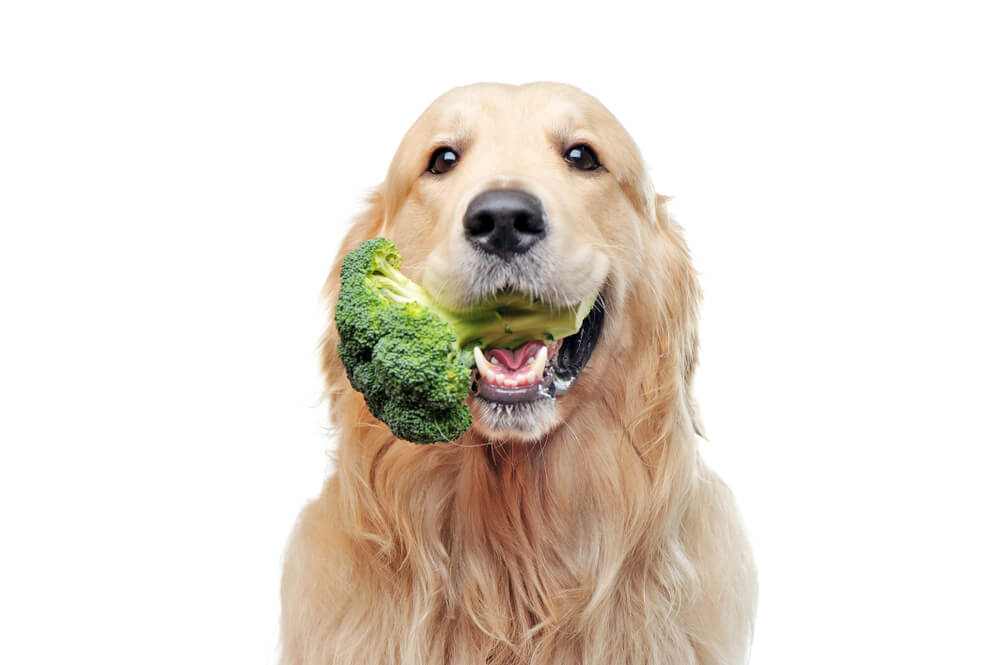
DogFoodAdvisor is reader supported See how
All reviews are 100% impartial but if you buy using links on this page, we may earn a referral fee.
Dogs are omnivores, which means they can derive nutrients from both plant and animal sources. While they can survive on a well-balanced vegan diet, it’s crucial to ensure that the food you choose provides all the essential nutrients they require for good health.
Vegan dog food needs to contain a carefully balanced combination of plant-based ingredients to ensure it provides all the essential nutrients dogs need for optimal health.
Here are some guidelines for choosing the best vegan dog food.
Dogs require a source of protein for muscle health and overall well-being. Vegan dog food typically relies on plant-based protein sources, such as soy, peas, lentils, chickpeas and beans. The protein content should be adequate and meet your dog’s specific requirements, which can vary based on factors like age, size, and activity level.
Essential amino acids like taurine and L-carnitine for heart health and overall well-being are vitally important for dogs. Vegan dog food should include these amino acids in sufficient quantities and if they don’t supplements should be added.
Dogs need dietary fats for energy, skin health, and the absorption of fat-soluble vitamins. Vegan dog food typically includes fats from plant sources such as flaxseed, sunflower oil and canola oil.
Easily-digestible carbohydrates from grains (e.g., brown rice, oats, barley) and vegetables are important too for providing energy and fiber in the diet. Fiber is essential for digestive health and can come from ingredients like vegetables, fruits, and whole grains.
Vegan dog food should also contain essential vitamins, including vitamin A, vitamin D, vitamin E, and vitamin B12. Vitamin B12 is typically not found in plant-based diets so, again, would needs to be supplemented.
Essential minerals such as calcium, phosphorus, potassium, sodium, magnesium and iron must be present in appropriate ratios for healthy bone and muscle development.
It’s important to recognize that not all dogs will thrive on a vegan diet, and individual requirements can vary. Some dogs have specific health conditions or dietary restrictions that may require a specialized diet.
Always prioritize your dog’s health and well-being when making dietary choices for them, and consult with a professional for guidance. If you have ethical or environmental reasons for choosing a vegan diet for your dog, ensure that it’s done in a way that prioritizes their health and nutritional needs.
You might also find this article Can Dogs Be Vegetarian or Vegan? by the founder of the Dog Food Advisor, Dr Mike Sagman, helpful.
Please note: We sure you’ve noticed that these vegan foods are currently unrated. This is because our review methodology favors dog foods rich in meat, and judging a plant-based diet against this criteria would always give a low rating.
Studies of plant-based diets for dogs are showing some great results, as well as providing preferable options for many dogs with allergies or those wanting to choose more environmentally sustainable options. We’ll leave these unrated whilst we consider how best to rate this new offering within the dog food market.
See below, our recommendations of the best vegan dog foods to help you make the right choice for your dog. You’ll also see answers to some of the frequently asked questions we receive about feeding your dog a vegan diet, which we hope you find informative.
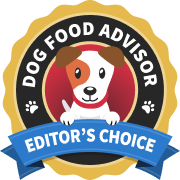
Best Vegan Dog Food December 2025
-
Best Vegan Dog Food
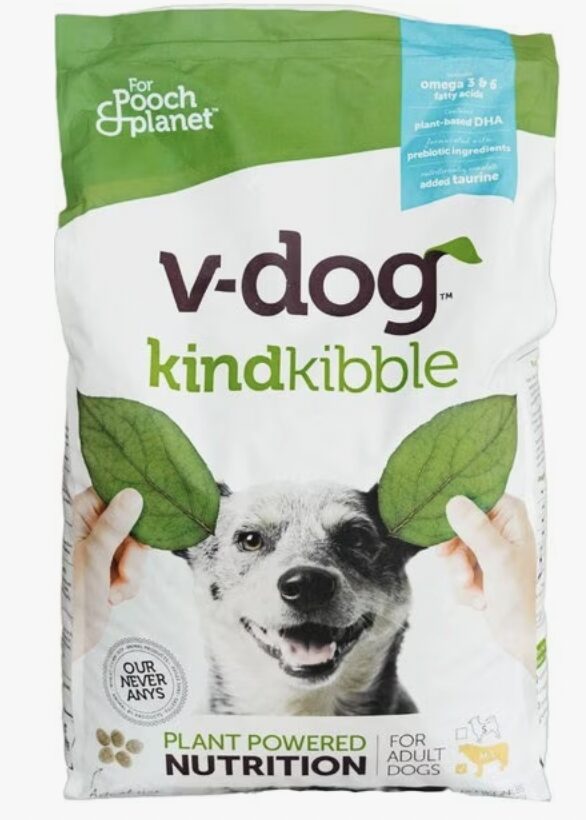
V-Dog Kind Kibble
UnratedV-Dog Kind Kibble Vegan Adult Dry Dog Food is complete and nutritionally balanced for all dog breeds and is fully supplemented to include all the nutrients your pet needs.
Made in the USA with 100% vegan whole foods – including peas, lentils, quinoa and brown rice, V-Dog Kind Kibble Vegan Adult Dry Dog Food is designed to help eliminate allergic reactions, improve oral hygiene, support a healthy skin and coat, and manage weight.
This recipe also includes L-carnitine, taurine, omega-3 and -6 fatty acids, DHA, and prebiotics!
Dry matter label analysis reveals it contains 27% protein, 10% fat and 55.3% carbohydrates, which means the fat-to-protein ratio is about 38%.
Read our review of the full V-Dog Dog Food (Dry) range here
Things we like
- Added prebiotics
- Includes taurine
- Omega 3 and 6 fatty acids
Main Ingredients Dried peas, pea protein, brown rice, oatmeal, potato protein Texture Dry Type Grain inclusive (brown rice & oatmeal) Protein Percentage 27% AAFCO Standards Maintenance Best For Adult & senior dogs Sample buyer review...
Read more buyer reviews at Chewy.com"I feel good about feeding my animals food that doesn’t require other animals to die. My dogs love this food and even enjoy it as a treat if they’ve already had their max amount of cookies that day. This food also comes in mini bites which is perfect for my Chihuahua."
We also highly recommend
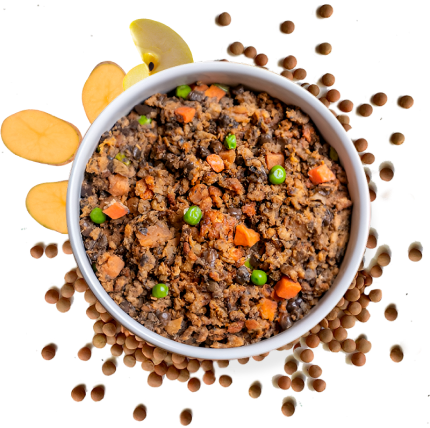
Bramble Fresh Vegan - The Cowbell
Formulated by board-certified vet nutritionists, this recipe is packed with whole food ingredients and gently cooked to maintain maximum nutrition. Bramble was founded by Amanda Rolat founded Bramble in 2021, after she struggled to find pet food that aligned with her values.
-
Best Dry Vegan Dog Food
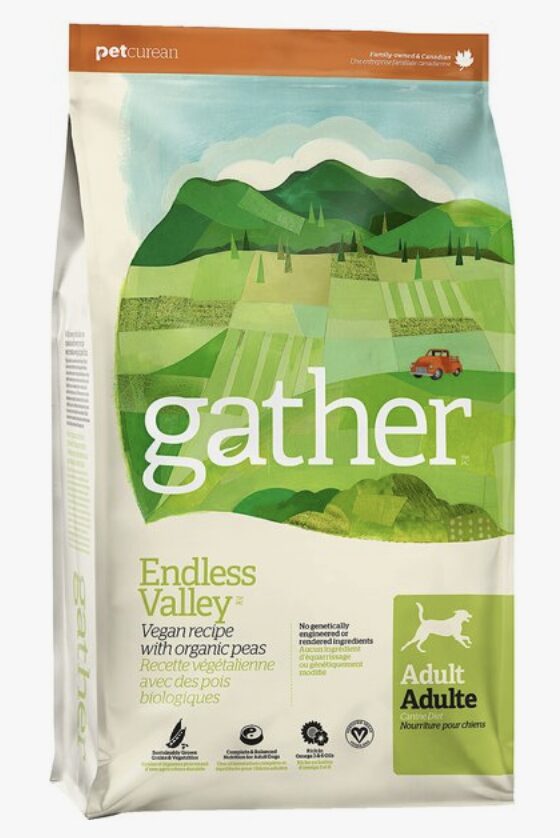
Gather Endless Valley Vegan Dry Dog Food
UnratedGather Endless Valley Vegan Dry Dog Food is a great option for dogs who are sensitive to animal proteins and thrive on a plant-based diet.
It’s crafted with carefully selected certified organic ingredients and has a perfect blend of 100% plant-based protein from organic peas and other natural ingredients.
Carefully balanced by expert pet nutritionists, this recipe provides wholesome and natural nutrition.
Our dry matter label analysis reveals this recipe has a protein level of 29%, fat 14% and estimated carbohydrate content of 89%, leading to a fat to protein ratio of 50%
Read our review of the full Gather Dog Food (Dry) range here
Things we like
- Organic ingredients
- Formulated with pet nutritionists
- Natural
Main Ingredients Organic peas, organic barley, organic oats, lentils, organic sunflower oil Texture Dry Type Grain-inclusive (barley & oats) Protein Percentage 29% AAFCO Standards Maintenance Best For Adult dogs Sample buyer review...
Read more buyer reviews at Chewy.com"It is a great option for when my picky dog decides she needs a change. She tolerates it well, with no itching, runny poop or scratchy bottoms. It is a great addition to our food line up."
-
Best Wet Vegan Dog Food
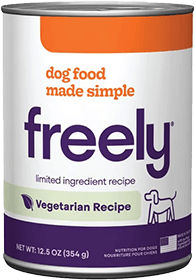
Freely Vegetarian Recipe Limited Ingredient Grain-Free
UnratedThis limited ingredient diet dog food uses pea protein and other plant-based sources to provide amino acids need for muscle maintenance and overall health.
It is suitable for dogs with grain sensitivities or allergies and is fortified with essential vitamins, minerals and taurine to ensure balanced nutrition, supporting heart and eye health.
Our dry matter label analysis reveals it has a protein content of 32%, fat of 11% and an estimated carbohydrate level of 49% which means the fat to protein ratio is 36%.
Read our review of the full freely Dog Food (Wet) range here
Things we like
- Fiber rich ingredients
- Contains taurine
- Balanced
Main Ingredients Water, peas, pea protein, sweet potatoes, sunflower oil, Texture Wet Type Grain-Free Protein Percentage 32% AAFCO Standards U Best For Dogs with sensitivities and allergies Sample buyer review...
"My fur baby loved this blend! She needs to lose a few pounds and she has more energy eating this food and we usually add this to her dry vegan kibble."
-
Best Vegan Dog Food for Skin & Coat Health
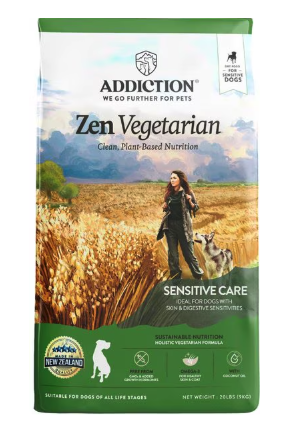
Addiction Zen Vegetarian Plant Based Skin & Coat Health Dry Dog Food
UnratedAddiction Zen Vegetarian Sensitive Care Dry Dog Food is a plant-based diet designed for dogs of all life stages with skin and digestive sensitivities.
The thoughtful formula is packed with wholesome ingredients like oats, soybean meal, rice, peas, and dried kelp to support your dog’s overall health. Coconut oil and omega-3 fatty acids from flaxseed promote healthy skin and a glossy coat.
There’s also plenty of fiber to aid in healthy digestion.
Our dry matter label analysis reveals this recipe has a protein level of 24%, 10% fat and 58% carbs, leading to a fat to protein ratio 0f 41%
Read our review of the full Addiction Dog Food (Dry) range here
Things we like
- Suitable for dogs and puppies
- Fiber-rich
- Ideal for skin issues
Main Ingredients Oats, soybean meal, rice, peas, coconut oil, Texture Dry Type Grain-inclusive (oats & rice) Protein Percentage 24% AAFCO Standards All Life Stages Best For Dogs and pupies Sample buyer review...
Read more buyer reviews at Chewy.com"Although my dog has most of her life consumed plant based dog-food - with additional meat containing treats etc, I always found something wrong with her food e.g. canola oil and other ingredients. This food is GMO free. I love that it is made with coconut oil, a winner for every platform. I was worried if she would like it but it really did not take a lot for her, I only mixed it with her old food one time, after that — with additional peanut butter to sweeten the deal and she is eating it. Great."
-
Best Vegan Dog Food for Brain Health
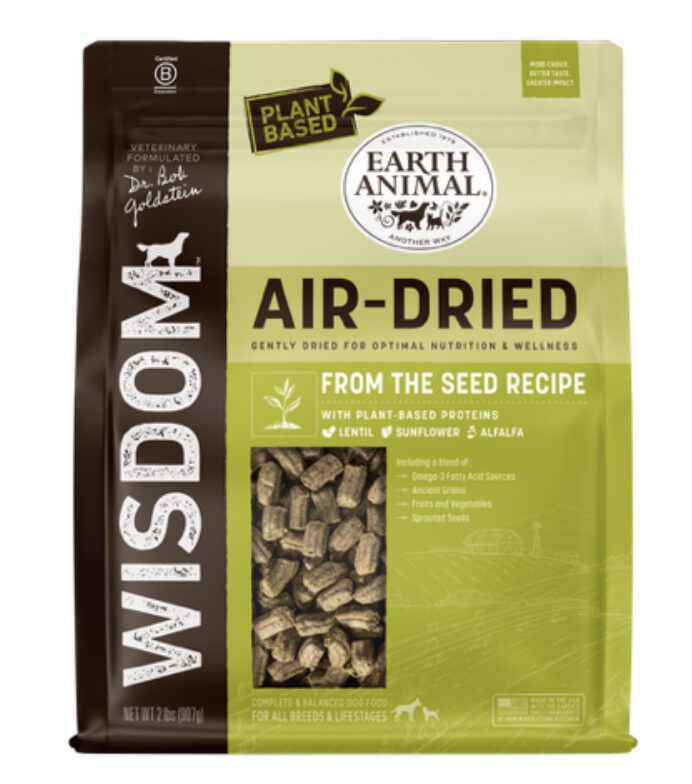
Earth Animal Wisdom From the Seed Recipe
UnratedEarth Animal Wisdom From the Seed Recipe includes high-quality plant-based proteins from ingredients like lentils, chickpeas, and peas, which are excellent sources of amino acids essential for a dog’s health.
The recipe includes plant-based sources of omega-3 fatty acids, such as flaxseed oil, which are essential for brain health and cognitive function. Omega-3s, especially DHA, are known to support brain development and maintain neurological health.
Ingredients like sweet potatoes, spinach, and blueberries (often found in high-quality vegan dog foods) are rich in antioxidants. These help combat oxidative stress in the brain, reducing the risk of cognitive decline as dogs age.
Our dry matter label analysis reveals this food contains 34% protein, 16% fat and an estimated carbohydrate content of 42%. This means the fat to protein ratio is around 46%.
Read our review of the full Earth Animal Wisdom Dog Food (Air-Dried) range here
Things we like
- Omega 3 fatty acids
- Rich in antioxidants
Main Ingredients Lentil protein, sunflower meal, quinoa, potato protein, alfalfa nutrient concentrate Texture Dry Type Grain-inclusive (oats) Protein Percentage 34% AAFCO Standards All Life Stages Best For Dogs and puppies Sample buyer review...
Read more buyer reviews at Earth Animal"My dogs had a great experience on From the Seed. Once we weened them onto it, we were able to rotate it in and out of other flavors of Wisdom with no problems at all."
-
Best Vegan Dog Food for Gut Health
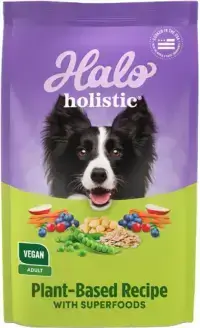
Halo Holistic Plant-Based with Superfoods Adult
UnratedHalo Holistic vegan dog food is made with a variety of premium ingredients enriched with essential vitamins and minerals to support your dog’s digestive health.
This kibble is completely free of GMOs, soy, corn, wheat, artificial colors, flavors, and preservatives and includes high fiber ingredients like sweet potatoes, pumpkin, and peas which promote regular bowel movements and improving gut motility.
Prebiotic fibers, often included in plant-based diets, nourish beneficial gut bacteria, fostering a balanced microbiome that aids digestion and nutrient absorption.
Dry matter label analysis reveals this recipe contains 30% protein, 16.5% fat and 46% carbs, with a fat to protein ratio of 56%.
Read our review of the full Halo Holistic Healthy Grains Dog Food (Dry) range here
Things we like
- Prebiotic fibers
- Includes superfoods
- Enriched with vitamins and minerals
Main Ingredients Oats, peas, chickpeas, potato protein, brewers dried yeast, sunflower oil Texture Dry Type Grain-inclusive (oats) Protein Percentage 30% AAFCO Standards Maintenance Best For Adult dogs Sample buyer review...
Read more buyer reviews at Chewy.com"My senior dog has been enjoying this food for several years now. It keeps the inflammation down in his arthritic joints, promotes healthy digestion, his fur is always soft and clean, no vomiting. He’s very healthy, and my vet is very happy with his bloodwork and other tests every check-up. Great nutrition."
More Top Picks
To view more top dog foods by category… click the link below that best meets your personal feeding needs.
Frequently Asked Questions
Is a vegan diet nutritionally complete for dogs, and can it meet all their dietary requirements?
A vegan diet for dogs can be nutritionally complete if carefully formulated and supplemented to meet their specific dietary requirements. Dogs are omnivores, which means they can obtain nutrients from both plant and animal sources. While it is possible to create a nutritionally balanced vegan diet for dogs, it can be more challenging and requires close attention to detail.
Here are some considerations:
Protein: Dogs need protein for muscle maintenance and overall health. Plant-based protein sources such as soy, peas, lentils, and beans can provide protein, but they may not contain all the essential amino acids in sufficient quantities. Taurine and L-carnitine are examples of amino acids that are typically found in animal-based protein sources and may need to be supplemented in a vegan diet for dogs.
Vitamin B12: Vitamin B12 is primarily found in animal-based foods. Vegan dog food must be supplemented with vitamin B12 to prevent deficiencies.
Omega-3 Fatty Acids: Dogs require omega-3 fatty acids for skin health, coat shine, and overall well-being. Sources like flaxseed or algal oil can provide these essential fatty acids in a vegan diet.
Calcium and Phosphorus: Ensuring the right balance of minerals, particularly calcium and phosphorus, is essential for healthy bone development. Vegan diets may require careful attention to these mineral levels.
Fiber: Plant-based diets often contain more fiber, which can impact digestion. Some dogs may not tolerate high levels of fiber well.
Digestibility: Not all plant-based ingredients are easily digestible for dogs, and some may cause digestive issues. Careful selection of ingredients and monitoring of your dog’s digestive health are essential.
Palatability: Some dogs may not find vegan dog food palatable, and individual taste preferences can vary.
What are the potential health risks or deficiencies associated with a vegan diet for dogs?
A vegan diet for dogs can pose certain health risks and potential nutritional deficiencies if not carefully formulated and monitored. Dogs have specific dietary requirements, and when these needs are not met adequately in a vegan diet, various health issues can arise.
Here are some potential health risks and deficiencies associated with a vegan diet for dogs:
Protein Deficiency: Dogs require high-quality protein for muscle maintenance, immune function, and overall health. Vegan diets may rely on plant-based protein sources, which may not provide all the essential amino acids in the right proportions. This can lead to protein deficiencies if not carefully balanced.
Amino Acid Imbalances: Taurine and L-carnitine are essential amino acids for dogs, and they are typically found in animal-based protein sources. Vegan diets may lack these amino acids, leading to heart and muscle health issues if not adequately supplemented.
A vegan diet for dogs can pose certain health risks and potential nutritional deficiencies if not carefully formulated and monitored. Dogs have specific dietary requirements, and when these needs are not met adequately in a vegan diet, various health issues can arise.
Here are some potential health risks and deficiencies associated with a vegan diet for dogs:
Protein Deficiency: Dogs require high-quality protein for muscle maintenance, immune function, and overall health. Vegan diets may rely on plant-based protein sources, which may not provide all the essential amino acids in the right proportions. This can lead to protein deficiencies if not carefully balanced.
Amino Acid Imbalances: Taurine and L-carnitine are essential amino acids for dogs, and they are typically found in animal-based protein sources. Vegan diets may lack these amino acids, leading to heart and muscle health issues if not adequately supplemented.
What are some signs that my dog may not be thriving on a vegan diet?
If you’ve transitioned your dog to a vegan diet and are concerned about their well-being, it’s essential to monitor for signs that may indicate your dog is not thriving on the diet. While some dogs can adapt to a vegan diet with proper planning and monitoring, others may experience health issues or deficiencies.
Here are some signs to watch for:
Weight Loss or Poor Weight Gain: If your dog is losing weight or not gaining weight as expected, it may be a sign that they are not getting enough calories or essential nutrients from their vegan diet.
Lethargy and Weakness: Reduced energy levels, decreased activity, or overall weakness can be indicators of nutritional deficiencies, such as inadequate protein or essential amino acids.
Skin and Coat Problems: Dull, dry, or flaky skin, along with a lackluster coat, may suggest a deficiency in omega-3 fatty acids or other essential nutrients needed for skin and coat health.
Digestive Issues: Frequent diarrhea, vomiting, gas, or bloating can be signs that your dog is not digesting the vegan diet well, which may be due to specific ingredients or fiber content.
Behavioral Changes: Unusual changes in behavior, including irritability, anxiety, or excessive aggression, can sometimes be linked to nutritional imbalances affecting the dog’s overall well-being.
Reduced Muscle Mass: Muscle wasting or a decrease in muscle mass may occur if your dog is not getting enough protein or essential amino acids.
Dental Problems: Poor dental health, including gum disease, tooth decay, or bad breath, can be a result of diet-related issues, such as inadequate nutrients or high sugar content in some vegan treats.
Joint and Bone Issues: Problems with bones or joints, such as stiffness, pain, or lameness, can be associated with imbalances in calcium and phosphorus in the diet.
Immune System Weakness: Frequent illnesses or a weakened immune system could be linked to nutritional deficiencies affecting your dog’s overall health.
Change in Stool Quality: Drastic changes in the color, consistency, or frequency of your dog’s stool may indicate that their digestive system is not handling the vegan diet well.
If you observe any of these signs or are concerned about your dog’s well-being on a vegan diet, it’s crucial to consult with a veterinarian or an animal nutritionist promptly. They can assess your dog’s health, conduct blood tests to check for nutritional deficiencies, and recommend dietary adjustments or supplements as needed.
In some cases, a transition to a balanced commercial dog food that includes animal-derived ingredients may be necessary to address specific health concerns. Always prioritize your dog’s health and well-being when making dietary choices for them.
Final word
The Dog Food Advisor does not accept money, gifts, samples or other incentives in exchange for special consideration in preparing our reviews.
However, we do receive a referral fee from online retailers (like Chewy or Amazon) and from sellers of perishable pet food when readers click over to their websites from ours. This helps cover the cost of operation of our free blog. Thanks for your support.
For more information, please visit our Disclaimer and Disclosure page.




